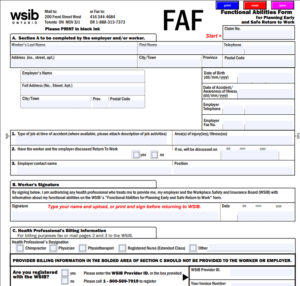Disability can be understood as a broad concept that encompasses physical, sensory, cognitive, and mental impairments.
It refers to conditions that may limit an individual’s ability to engage in certain activities or participate fully in society.
Disability is not solely determined by a person’s impairments but is also influenced by environmental and social factors.
The Gig Economy and Freelance Work
The gig economy and freelance work have experienced significant growth and have had a profound impact on the labor market in recent years. The gig economy refers to a labor market characterized by short-term contracts, freelance work, and temporary engagements, where individuals are often hired on a project-by-project basis. Freelance work, on the other hand, involves individuals offering their services on a self-employed basis, often working independently or through intermediary platforms.
Challenges and Barriers for Disabled Individuals
As such, disability management in the gig economy and freelance work has become an increasingly important topic as the nature of work continues to evolve. With the rise of gig platforms and freelance opportunities, individuals with disabilities face unique challenges and barriers in accessing and thriving in these non-traditional work arrangements. Ensuring disability inclusion in the gig economy requires a comprehensive approach that addresses issues such as limited job opportunities, income instability, lack of workplace benefits, accessibility concerns, and social isolation. By implementing effective disability management strategies, including policy frameworks, accommodations, and support networks, we can foster an inclusive work environment where disabled individuals can fully participate and succeed in the gig economy and freelance work.
Transformation of the Labor Market
These non-traditional work arrangements have revolutionized the way people work and have transformed the dynamics of the labor market. The gig economy and freelance work have gained popularity due to several factors. Firstly, technological advancements and the proliferation of online platforms have facilitated the matching of gig workers with potential clients or customers, enabling seamless and efficient work transactions. Secondly, the desire for greater flexibility and autonomy has driven many individuals to seek gig work, as it allows them to have more control over their schedules and choose projects that align with their interests and skills.
Implications for the Labor Market
The gig economy and freelance work have brought about significant changes in the labor market, shaping employment trends and challenging traditional employment models. Many industries have witnessed a shift towards a more project-based and on-demand workforce. Companies are increasingly turning to gig workers and freelancers to meet their immediate needs, reduce costs, and adapt to rapidly changing market demands. This shift has implications for job security, work benefits, and the overall structure of the labor market.
Promoting Disability Inclusion
As the gig economy and freelance work continue to grow, it is crucial to address disability inclusion within this context. Disabled individuals face unique challenges in accessing and participating in these non-traditional work arrangements. It is important to recognize that disability should not be a barrier to equal opportunities and meaningful employment.
Benefits of Disability Inclusion
Promoting disability inclusion in the gig economy and freelance work is essential for several reasons. Firstly, it aligns with principles of equal rights, ensuring that disabled individuals have the same opportunities to engage in work and contribute to the economy. Secondly, by incorporating disability inclusion practices, businesses and platforms can tap into a diverse pool of talent, benefiting from a range of skills, perspectives, and experiences that disabled individuals bring. Thirdly, disability inclusion fosters innovation and creativity, as diverse teams are more likely to generate unique ideas and solutions. Lastly, addressing disability inclusion enhances the overall well-being and quality of life for disabled workers, allowing them to participate fully in society and enjoy the benefits of economic independence.
Medical Model
The medical model of disability views disability as a personal deficiency or impairment that needs to be treated or fixed. It focuses on the individual’s medical condition and emphasizes interventions to mitigate or cure the impairment. The medical model often places the responsibility on the individual to adapt to the prevailing societal norms. Traditional assessments of disability may rely on medical evaluations to determine an individual’s functional limitations or capabilities. These evaluations may be used to determine eligibility for certain accommodations or supports.
Social Model
The social model of disability, in contrast, emphasizes the role of societal barriers and structural limitations in creating disability. It posits that disability is not solely a result of an individual’s impairment but is also influenced by the physical, attitudinal, and institutional barriers present in society. The social model advocates for removing these barriers to enable equal access and opportunities for disabled individuals.
In the context of the gig economy and freelance work, disability is often understood through a combination of the medical and social models, although there is a growing shift towards adopting a more inclusive approach.
Accessibility and Accommodations
To accommodate disabled individuals in the gig economy and freelance work, it is crucial to address accessibility concerns. This includes ensuring that digital platforms and communication channels are designed to be accessible to individuals with various disabilities. Accommodations may also include flexible work arrangements, adjustable workspaces, assistive technologies, or modifications to tasks and workflows.
Inclusive Hiring Practices
Adopting inclusive hiring practices that focus on skills, qualifications, and potential rather than solely on physical or cognitive abilities can help promote disability inclusion in the gig economy and freelance work. Platforms and clients should actively work to reduce biases and discrimination in the selection process.
Support Networks and Peer Mentoring
Building support networks and peer mentoring opportunities for disabled individuals in the gig economy and freelance work can help foster inclusion and provide guidance and assistance in navigating the unique challenges they may face. Such networks can offer a sense of belonging, shared experiences, and access to valuable resources.
Policy and Legal Frameworks
Implementing comprehensive policies and legal frameworks that safeguard the rights of disabled workers is crucial. These frameworks should address issues such as non-discrimination, accessibility standards, reasonable accommodations, and the enforcement of disability rights in the gig economy and freelance work.
Creating a disability-inclusive environment in the gig economy and freelance work involves implementing strategies such as providing reasonable accommodations, ensuring accessibility, addressing discriminatory practices, and fostering a culture of inclusivity. It requires collaboration among stakeholders, including governments, businesses, platforms, disability advocacy organizations, and disabled workers themselves
Barriers and Challenges
In the gig economy and freelance work, disabled individuals may encounter several barriers and challenges that impede their participation and success.
Limited Access to Job Opportunities
Disabled workers may face difficulties in accessing gig economy and freelance work due to biases, discrimination, and lack of inclusive hiring practices by employers or platforms.
Income Instability and Inconsistent Work
The irregular nature of gig work can lead to income instability, as disabled workers may experience periods of low demand or struggle to secure consistent projects, impacting their financial security and overall well-being.
Lack of Workplace Benefits and Protections
Gig workers typically lack traditional employment benefits such as health insurance, retirement plans, and paid leave, leaving disabled workers vulnerable and without essential supports.
Absence of Accommodations and Accessibility
Gig platforms and freelance workspaces may not provide adequate accommodations or address accessibility issues, making it challenging for disabled workers to fully participate and perform their tasks effectively.
Social Isolation and Limited Support Networks
Working remotely or independently can result in social isolation and limited opportunities for disabled workers to connect with peers, mentors, or support networks, potentially impacting their mental well-being and professional development.
Strategies for Disability Management
To address these challenges and promote disability inclusion in the gig economy and freelance work, a number of strategies can be implemented.
Policy and Legal Frameworks
Governments and regulatory bodies can establish comprehensive policies and legal frameworks that protect the rights of disabled workers, ensure non-discrimination, and mandate accessibility standards for gig platforms and freelance work.
Education and Awareness Programs
Conducting education and awareness campaigns to increase understanding and reduce stigmas associated with disabilities is crucial. This can foster a culture of inclusion and promote equitable treatment of disabled workers.
Accessible Technology and Infrastructure
Gig platforms and freelance workspaces should invest in accessible technology and infrastructure to ensure disabled individuals can fully engage in work tasks, communicate effectively, and access necessary resources.
Accommodations and Workplace Adjustments
Employers, platforms, and clients should provide reasonable accommodations and workplace adjustments to meet the specific needs of disabled workers. This may include flexible schedules, assistive technologies, ergonomic equipment, and modifications to physical spaces.
Peer Support and Networking Opportunities
Creating peer support groups, mentorship programs, and networking opportunities can facilitate connection, knowledge sharing, and professional growth among disabled workers. Online communities and platforms can provide a virtual space for collaboration and support.
Health and Well-being Initiatives
Prioritizing the health and well-being of disabled workers is essential. This can involve offering mental health support, promoting work-life balance, implementing flexible work arrangements, and providing access to healthcare services and resources.
Collaboration and Partnerships
Collaborations and partnerships among various stakeholders play a crucial role in disability management in the gig economy and freelance work.
Government and Regulatory Bodies
Governments should collaborate with disability advocacy organizations, gig platforms, and freelance associations to develop and enforce inclusive policies, promote accessibility, and establish accountability mechanisms.
Gig Economy Platforms and Freelancer Platforms
Platforms can proactively invest in accessibility features, provide disability-related resources, and ensure inclusive hiring practices. Collaborations with disability organizations can help platforms better understand the needs of disabled workers and implement effective supports.
Disability Advocacy Organizations
These organizations can advocate for the rights and interests of disabled workers, offer guidance and resources to gig platforms and freelance workers.
Conclusion
Disability management in the gig economy and freelance work is essential for creating an inclusive and equitable future of work.
By recognizing and addressing the unique challenges faced by disabled individuals, such as limited access to opportunities, income instability, and lack of accommodations, we can promote equal participation and support their success in these evolving work arrangements. Collaboration among governments, gig platforms, disability advocacy organizations, and freelancers themselves is vital in implementing effective strategies, policies, and initiatives that prioritize disability inclusion.
By embracing a proactive and inclusive approach, we can build a work environment that values diversity, fosters equal opportunities, and empowers disabled workers to thrive in the gig economy and in freelance work.
FAQs:
How can gig platforms and freelance clients promote disability inclusion?
Gig platforms and freelance clients can promote disability inclusion by adopting inclusive hiring practices that focus on skills and qualifications rather than physical or cognitive abilities. They should actively work to reduce biases and discrimination in the selection process. Additionally, investing in accessible technology and infrastructure, providing reasonable accommodations, and offering flexible work arrangements can help ensure disabled individuals can fully participate and thrive in gig work.
What are the key challenges faced by disabled workers in the gig economy and freelance work?
Disabled workers in the gig economy and freelance work face several challenges, including limited access to job opportunities due to biases and discrimination, income instability and inconsistent work, lack of workplace benefits and protections, absence of accommodations and accessibility, and social isolation with limited support networks. These challenges can hinder their participation and success in non-traditional work arrangements.
How can policy and legal frameworks contribute to disability inclusion in the gig economy and freelance work?
Comprehensive policies and legal frameworks play a crucial role in promoting disability inclusion. Governments and regulatory bodies can establish non-discrimination laws, accessibility standards, and enforcement mechanisms to safeguard the rights of disabled workers. These frameworks can ensure that gig platforms and freelance workspaces are accessible, provide reasonable accommodations, and adhere to inclusive practices, fostering an environment where disabled individuals have equal opportunities for meaningful employment.
What role can support networks and peer mentoring play in promoting disability inclusion?
Support networks and peer mentoring opportunities are valuable in promoting disability inclusion in the gig economy and freelance work. These networks provide disabled workers with a sense of belonging, shared experiences, and access to resources. They can offer guidance and assistance in navigating the unique challenges faced by disabled individuals in non-traditional work arrangements, facilitating their professional development and overall well-being.
How can education and awareness programs contribute to disability inclusion?
Education and awareness programs are essential in reducing stigmas associated with disabilities and increasing understanding. By fostering a culture of inclusion, these programs promote equitable treatment of disabled workers in the gig economy and freelance work. They help raise awareness about the rights and needs of disabled individuals, encouraging employers, platforms, and clients to adopt inclusive practices and provide necessary accommodations.






